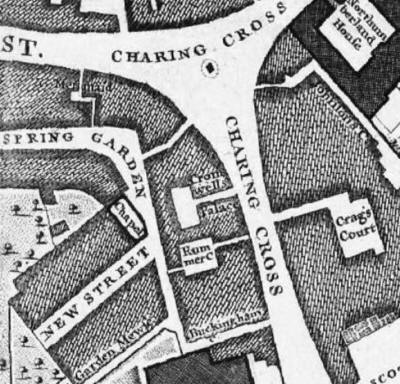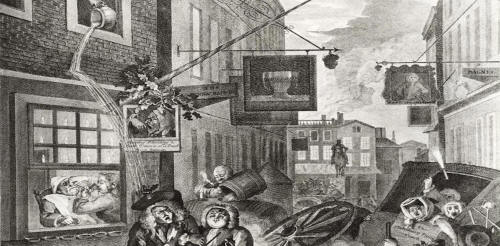

Search london history from Roman times to modern day
St Martins pub history index
THE RUMMER TAVERN.

Rummer court, Charing Cross in 1746 -
John Rocque map
The locality of this noted tavern is given by Cunningham, as "two doors from Locket's, between Whitehall and Charing Cross, removed to the water-side of
Charing Cross, in 1710, and burnt down Nov. 7th, 1750. It was kept in the reign of Charles II., by Samuel Prior, uncle of Matthew Prior, the poet, who thus
wrote to Fleetwood Shephard :
One of the most famous taverns at Charing Cross was the "Rummer," of which the present well-known " Ship " at No. 35 Charing Cross is a direct descendant. It is now, I think, the Ship Restauraunt (Pratti Rugero's) and is numbered 45, not, as formerly, 35 Charing Cross. No trace of the "Rummer " exists. It is described as being two doors from another well-known restaurant, to wit, Lockitts, the site of which is now occupied by Drummond's bank.
Cunningham, in his " London," says, without stating his authority, that the " Rummer " was removed to the waterside (by which he means merely the river side of the street) of Charing Cross in 1710, and was burnt down November 7, 1750. But he must be in error as to this, for in an advertisement given below, relating to the exhibition of a wonderful " Luminous Ampitheatre " of 200 fountains at the "Rummer" in 1742, it will be seen that, at the end, it is plamly stated that "There is a back door" (from the tavern) " into Spring Gardens," Spring Gardens being of course on the south-west side of Charing Cross, or on the right as we should now proceed down Whitehall from Trafalgar Square.
The hospitality of the "Ship," by which sign the tavern was known at least as early as 1731, must have been extended to many who underwent the sanguinary discipline of the various tortures associated with the " wooden peccadilloes," as the pillory was called, or of even the milder correction of the whipping-post, which may to this day be seen preserved in the crypt of the church of St. Martin's-in-the-Fields. Branding, nose-slitting, and ear-lopping were the least noteworthy of his congenial duties, and the common hangman, sooth to say, found merely his pastime therein, compared with what he had to perform until public indignation was aroused.
On June 10, 1731, Joseph Crook, alias Sir Peter Stranger, stood on the pillory for one hour, after which he was seated in an elbow-chair, and the common hangman cut both his ears off with an incision knife, and showed them to the spectators ; afterwards delivered them to Mr. Watson, a sheriff's officer, then slit both his nostrils with a pair of scissors, and seared them with a hot iron, pursuant to his sentence. He had a siurgeon to attend him on the pillory, who immediately applied things necessary to prevent the effusion of blood. He underwent it all with undaimted courage ; afterwards went to the Ship Tavern, at Charing Cross, where he stayed some time, then was carried to the King's Bench Prison, to be confined there for life. '' During the time he was on the pillory he laughed and denied the fact to the last."
In allusion to the ruff or collar known as the 'peccadillo," also known as the " wooden ruff." The hurdle on which felons were drawn to the place of execution was the "wooden chariot." See Dialogue on Oxford Pari, 1681
In 1742 the contents of the " Ship " were for sale. " To be Sold by Hand, On Monday next, and the following Days, till all are sold, The genuine Household Furniture of Thomas Giles, at the Ship Tavern, Charing Cross, consisting of all sorts of clean Household Furniture, and all sorts of Kitchen Furniture. Note, There is a Parcel of neat Wines to be dispos'd of at the same Place."
The tavern, however, merely changed hands, and in 1815 it is described in the "Epicure's Almanack" as follows:
"Until of late this concern was considered merely in the light of a public house. The present proprietor has removed the tap to the back premises, and in its former space has fitted up a Coffee-room, with a larder displaying steaks, chops, and other light dishes. He has done this purely for the accommodation of persons going or coming by the numerous short stages which draw up at the door." He also takes care to have an outlet into Spring Gardens. In the reign of Charles II., the " Ship," then known as the " Rummer," was kept by Samuel Prior, uncle of Matthew Prior, the poet, the family coimection ceasing in 1702. It was here that Jack Sheppard committed his first crime by stealing two silver spoons. In Hogarth's " Night" the sign of the " Rummer " hangs outside, and a skit on the Salisbury Flying Coach consists in that expeditious vehicle being overturned, with passengers inside, when it had only just started from the doors of the tavern, whose original situation, on the south-west side of Charing Cross, may be seen by comparing the site of Rummer Court in an old map dated 1734, and published in Smith's Qit, "Antiquities of Westminster," where it will be found that the court was situated between Buckingham Court and Cromwell Place.
Rummer Court survived the tavern on this site at least as late as 1761.

The Night - Hogarth and the Rummer Tavern opposite the Cardigans Head
The Rummer is introduced by Hogarth into his picture of " Night." and that a night of rejoicing, viz. the 29th of May; evident from the bonfires, the oaken bough upon the barber's pole, and the oak leaves fixed in the freemasons' hats. The scene is taken from the narrow part of Charing Cross, as it formerly stood before the way was widened, looking from Whitehall, and exhibits the Rummer Tavern on one side, and the Cardigan's Head on the other ;
A listing of historical public houses, Taverns, Inns, Beer Houses and Hotels in St Martins in Fields, London.
Residents at this address.
There are references to Samuel Prior being here in 1685. He is the Uncle of Matthew Prior, a famous poet. I carry more about him on the London Taverns site
September 1738 notes the death of a Mr Finch, Master of the Rummer Tavern, Charing Cross.
1805/William Drought/../../../Holdens Directory
We remember an old tavern, "the Rummer," in 1825, which was taken down with the lower portion of St. Martin's lane, to form Trafalgar square.
Trying to avoid privacy and cookie settings overwriting content